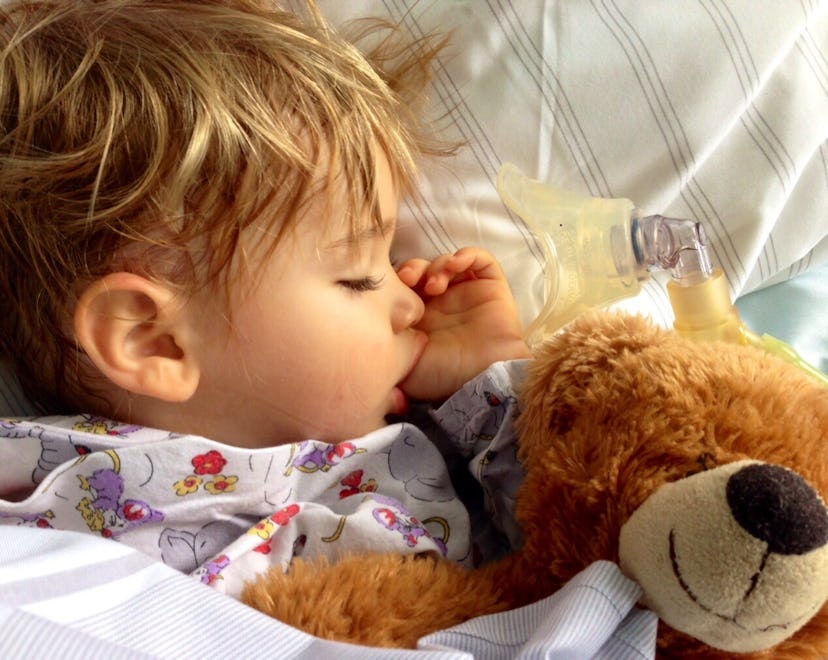Cold Season

Can You Give A Sleeping Baby A Breathing Treatment? Experts Explain
Make it a little easier for everyone.
When it comes to babies and illness, we are incredibly lucky to be living when there are things like nebulizers and spacers to help treat pulmonary ailments that so often affect babies and young kids, like croup and asthma. Of course, babies aren't always huge fans of such devices, which may make parents wonder, is it OK to give a baby albuterol before bed? Or, can you give a baby a breathing treatment while they’re sleeping?
If you are lucky enough not to know what a nebulizer is, it's basically a plastic mouth piece attached to a tube, and kind of makes your baby look like a little Bane from Batman. You hold it over the child's mouth, and the medicine inside comes out as a fine mist. Along with croup and asthma, a nebulizer is often employed if a child is suffering from pneumonia. A spacer similarly works by being attached to an inhaler, and is most generally used for things like asthma. Using an inhaler on its own requires a bit of coordination to use correctly. But with a spacer, the amount of time the inhaler takes to deliver medicine is drawn out, meaning the lungs can absorb the medicine more slowly.
Can you use albuterol or a nebulizer while your baby is sleeping?
Dr. Craig Canapari is a pediatrician at Yale New Haven Children’s Hospital and the Director of the Yale Pediatric Sleep Center, and he tells Romper that for certain breathing treatments like albuterol or saline, it’s perfectly fine to give them while a child is snoozing.
“It doesn’t really matter when you give a breathing treatment,” says Canapari. “Whether your baby is breathing quietly during sleep or yelling at the top of his lungs, if you are using the correct technique (either via nebulizer or MDI spacer) the medication should get to his lungs. Obviously talk to your doctor about learning the right way to give the medication.”
What about preventative medications?
He does take a different stance with “controller” or preventative medications, such as fluticasone or budesonide, both of which are used to treat asthma. “For controller medications, you typically want to rinse out your child’s mouth after administering the medication,” he says. “You can do this by brushing their teeth or using a wet facecloth to wipe off the inside of the mouth. This will prevent thrush and reduce absorption of the medication through the mucus membranes. If your goal is to give medication without waking your child up, rinsing out afterwards will almost certainly wake them up.”
Dr. Sara DuMond is a pediatrician, and she agrees that it is absolutely acceptable to give some breathing treatments while baby is sleeping, and says in many cases it’s much easier to administer these types of treatments if a baby is asleep. She says the only risks involved “have to do with whether or not your baby’s respiratory symptoms are the kind of respiratory issues that respond to these kinds of treatments.” But she does offer a word of caution regarding breathing treatments in general: “It's important to note that not all coughs or breathing issues are made better by these kinds of treatments; in fact, there are some conditions where these kinds of breathing treatments can actually hurt instead of help. So, always consult with your pediatrician before giving any kind of breathing treatment or medication, awake or asleep.”
Experts:
Dr. Craig Canapari, associate professor, Yale University School of Medicine, Director, Pediatric Sleep Center, Yale New-Haven Hospital Division of Pediatric Respiratory Medicine.
Dr. Sara DuMond, pediatrician
This article was originally published on